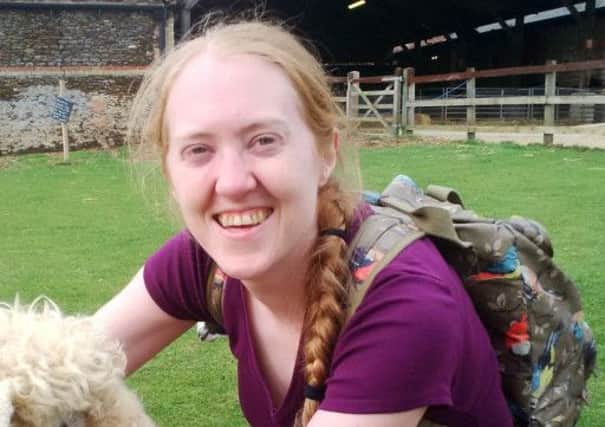Why I’m backing the fight to end second-class mental health care


Kerry Owen has been affected by schizoaffective disorder since the age of 19, but it took her years to access the right treatment.
She has encountered stigma and been wrongly arrested but after being referred to a specialist Early Intervention in Psychosis team she has finished her university degree and MSc, is starting a career in Public Health and getting married.
Advertisement
Hide AdAdvertisement
Hide AdNow she is backing a national campaign launched tomorrow to coincide with World Mental Health Day, fighting for better support for people with schizophrenia.
“Throughout my childhood I had emotional and behavioural difficulties,” explains Kerry, 30, from York.
“I was bullied at school, and was admitted to an eating disorders unit in hospital when I was 15. But it wasn’t until I was 19 and in my first year of university when I first started experiencing delusions and hearing voices.”
The first psychiatrist Kerry saw was really unhelpful.
“She basically said that I should lower my expectations and give up my degree. I didn’t get the right treatment, and I felt like I was in ‘pass the parcel’.
Advertisement
Hide AdAdvertisement
Hide Ad“My GP would refer me, but then I’d be told I wasn’t getting treatment because I didn’t fit the right boxes. Yet no-one else would see me because I was deemed ‘too ill’ or ‘psychotic’. For years I’d just be bounced around with endless horrible assessments and no help.”
Kerry hears voices when she gets stressed. They usually tell her to seriously injure herself and on one occasion to set herself on fire.
“I’ve experienced inadequate treatment many different times. Once I had a bad psychotic episode, and thought I had to set myself on fire to save the world. I went to A&E because I was scared that I couldn’t keep myself safe. They said they had no capacity to help me, but that they would send the crisis team in morning.
“But I was in crisis there and then, and the morning was far too late – I was lucky that I didn’t manage to hurt myself badly that night.
Advertisement
Hide AdAdvertisement
Hide Ad“I was also told on another occasion in A&E that several doctors and a social worker agreed that I needed to be sectioned and sent to hospital, but then they changed their minds and sent me home because there were no hospital beds.”
In the past Kerry has received support from her Quaker Meeting.
They even paid for her to go to a private hospital in York called The Retreat where for the firs time she felt she received treatment from a psychologist which helped her.
“That enabled me to understand the psychological effect of the bullying I’d suffered, which helped me to get better and finish my last year of university,” explains Kerry.
Advertisement
Hide AdAdvertisement
Hide Ad“I was also finally diagnosed with schizoaffective disorder, having had many other diagnoses in the past, and told that I needed support from an Early Intervention in Psychosis (EIP) team. “But the NHS psychiatrist wouldn’t refer me – I was only able to get that support after being sectioned.”
In the end it took seven years before Kerry finally got access to an EIP team.
“I cannot say enough good things about the support I got from it – the staff have been amazing. With their support, I have gone from being sectioned to finishing my masters in Public Health.
“Now I’m engaged to be married, and have a job as a researcher on antibiotic resistance for the NHS. I believe the key to my recovery has been my EIP team, as well as peer support groups and my psychiatrist. I also rely on the support of my partner and friends, and have found running, dancing and mental health campaigning really beneficial for my mental health.”
Advertisement
Hide AdAdvertisement
Hide AdKerry is backing a campaign launched tomorrow to raise awareness of schizophrenia and calling for more support for sufferers, who, the report claims, on average die 20 years younger than the general population.
Mark Winstanley, CEO of charity Rethink Mental Illness said: “It’s absolutely scandalous that people with schizophrenia are dying younger on average today than the population of 1930s Britain – an era when the NHS didn’t exist, penicillin wasn’t available, and tuberculosis and smallpox were rife. Those with schizophrenia are being badly let down in so many areas of care, and it’s having a devastating impact.
“Too many people with schizophrenia are also missing out on potentially life-changing treatments like talking therapies, and are just being fobbed off with medication alone.
“We would never say to someone with cancer that they can only have some of the treatments that are proven to work for their illness, but not others.
Advertisement
Hide AdAdvertisement
Hide Ad“Yet those with severe mental illness are expected to put up with second-class care.
“This has to change – it is completely inexcusable that so many people are dying unnecessarily. That’s why we’re launching the +20 campaign, to fight to give those with schizophrenia their twenty years back.
“We will not rest until people with schizophrenia have the same average life expectancy as everyone else.”
www.rethink.org